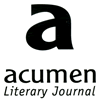Responses
Dear Acumen
I read Alex Smith’s piece, ‘Accessibility and Communication in Poetry’, with some interest as I have long been interested from a philosophical and linguistic point of view in the question of what and how poetry means, which his piece implicitly covers.
It seems to me that he comes close to defending two mistaken ideas on the interesting subject of how poetry means. These are implicitly (a) that poetic meaning requires a different account of meaning to the rest of language and more explicitly (b) that the meaning of a poem is somehow irreducible to the meaning of its parts, i.e. that it means what it says ‘as a whole’.
As far as (a) is concerned, he maintains the slightly surprising thesis that poetry, unlike most language, does not ‘communicate’, e.g. truth. I think he puts too much weight on the word ‘communicate’, so that his thesis may only rest on a verbal dispute, particularly as he wants to say that what poetry really does is ‘reveal’, e.g. truth. To me, this is a verbal distinction. Witness: ‘I revealed to Jones that ...’ and ‘I communicated to Jones that ...’.
Language is a public instrument. All language use is aimed, at least in part, at communication. The interesting question is how it does it, and there are interesting questions about what is going on in poems. But I do not think we should deny to poetry what we cannot deny to language outside poetry, i.e. a fundamental ‘communicative’ function.
Alex Smith’s argument here seems to rest on alleged views of T.S.Eliot and then the deconstructionists that neither a poet, nor indeed a poem, can completely control the meaning of a poem. From this he infers that poetry cannot be communicating in the normal way. But poststructuralism holds this indeterminacy of meaning in respect of all language, indeed of all signification. If it follows from this that poetry is not ‘communicating’ then it would follow that no language is communicating, and even the poststructuralists do not believe that. There are components of meaning that the author cannot control, but the idea that there is an entirely arbitrary relationship within a language between the signifier and the signified is false and, as language users, we rely on this falsehood.
Alex Smith’s idea of the ‘revelatory’ character of poetry points, I think, to this underlying view about the special nature of poetic language. He claims, mysteriously, that a successful poem says something that cannot be said in any other way, that it presents itself as a whole.
The major difficulty with this approach is that it leaves entirely obscure the relationship between a poem and its component parts, as though the poem acquires something above and beyond the various elements that comprise it that is irreducible to their sterling contributions. I find this approach to poetry as an art form, as well as to the technical issue of poetic meaning, a little worrying, because it seems to favour a hieratic elitism. If the truth that is ‘revealed’ in Wallace Stevens’ ‘The Snow Man’, one of Alex Smith’s examples, cannot be built up from its components, then who is to reveal it and how are we to know when it has been revealed? The poem is in danger of being turned into a locked door and only a priestly caste with a special knowledge may knock thereon. This would be great disservice to poetry in general, and to this poem in particular, which communicates to me, among the many things it communicates, the following entirely lucid thing
One must have a mind of winter
To regard the frost ....
And have been cold a long time ...
... ... ... ... ... ... ... ... ..... not to think
Of any misery in the sound of the wind
Robert Griffiths
Godalming, Surrey
Page(s) 85-86
magazine list
- Features

- zines

- 10th Muse
- 14
- Acumen
- Agenda
- Ambit
- Angel Exhaust
- ARTEMISpoetry

- Atlas
- Blithe Spirit
- Borderlines
- Brando's hat
- Brittle Star

- Candelabrum
- Cannon's Mouth, The
- Chroma
- Coffee House, The
- Dream Catcher
- Equinox
- Erbacce
- Fabric
- Fire
- Floating Bear, The
- French Literary Review, The
- Frogmore Papers, The
- Global Tapestry
- Grosseteste Review
- Homeless Diamonds
- Interpreter's House, The
- Iota
- Journal, The
- Lamport Court
- London Magazine, The
- Magma
- Matchbox
- Matter
- Modern Poetry in Translation
- Monkey Kettle
- Moodswing
- Neon Highway
- New Welsh Review
- North, The
- Oasis
- Obsessed with pipework
- Orbis
- Oxford Poetry
- Painted, spoken

- Paper, The
- Pen Pusher Magazine

- Poetry Cornwall
- Poetry London
- Poetry London (1951)
- Poetry Nation
- Poetry Review, The
- Poetry Salzburg Review
- Poetry Scotland
- Poetry Wales
- Private Tutor
- Purple Patch
- Quarto
- Rain Dog
- Reach Poetry
- Review, The
- Rialto, The
- Second Aeon
- Seventh Quarry, The
- Shearsman
- Smiths Knoll
- Smoke
- South
- Staple
- Strange Faeces
- Tabla Book of New Verse, The
- Thumbscrew
- Tolling Elves
- Ugly Tree, The
- Weyfarers
- Wolf, The

- Yellow Crane, The
